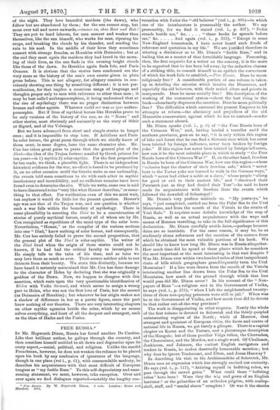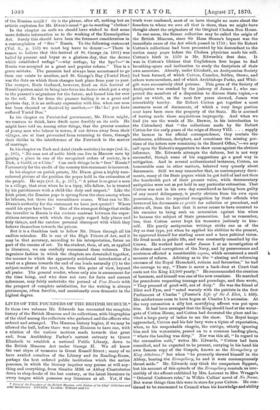FREE RUSSIA.*
IN Mr. Hepworth Dixon, Russia has found another De Custine. Like that brilliant author, he gallops through the country, and then considers himself entitled to sit down and dogmatize upon its -every aspect,—social, political, and religious. Unlike the candid Frenchman, however, he does not weaken the reliance to be placed upon his book by any confession of ignorance of the language, though in one place (vol i., p. 61), with commendable modesty, he describes his acquaintance with that most difficult of European tongues as "my feeble Russ." To this self-depreciatory and unas- -stuning statement, we must, however, take exception. Over and over again we find dialogues reported—notably the lengthy con-
* Free Ettssia. By W. Hepworth DLton. 2 vols. London: Hurst and Blackett. 1870.
versation with Fedor the "old believer "(vol i., p. 305)—in which one of the interlocutors is presumably the author. We say presumably, for we find it stated (vol. i., p. 307), "Fedor stands beside me," &c "these books he spreads before me," &c And again (vol. i., p. 313), "Except in some New-England homesteads, I have never heard such floods of
reference and quotation in my life." We are justified therefore in uttering a disclaimer as to Mr. Dixon's "feeble Russ," and in
hailing him as a master of that formidable language. Possessing, then, the first requisite for a writer on the country, it is the more to be regretted that he has been led away, by the seductive charms of a striking title, to commit himself to an epithet the correctness
of which his ivork fails to establish,—Free Russia. Does he mean religiously free ? A considerable portion of one volume is taken.
up in detailing the miseries which involve the Dissenters, and especially the old believers, with their sealed altars and priests in masquerade. Does he mean socially free ? His description of the working of the communal system—about the best thing in the book—abundantly disproves the assertion. Does he mean politically free ? The difficulties which surround the present Emperor in his attempts at reform—the obstinacy and prejudices of the old Muscovite conservatism against which he has to contend—render such a statement absurd.
Mr. Dixon speaks (vol. i., p. 9) of "the Free Russia born of the Crimean War," and, having landed a traveller amid the northern provinces, goes on to say, "it is only within this region
of lake and forest that he can find a Slavonic race which has never been tainted by foreign influence, never been broken by foreign
yoke." If this region has never been tainted by foreign influence, how can it be the most suitable place in which to study "the Free Russia born of the Crimean War ?" If, on the other hand, freedom in Russia be born of the Crimean War, how can this region—whose "colonies kept the charter of their freedom safe," which "never bent to the Tartar yoke nor learned to walk in the German ways," which "never had either a noble or a slave," whose people "clung for good or evil to their ancient life," and "disowned their Patriarch just as they had denied their Tsar''—be said to have made its acquaintance with freedom from the events which followed the downfall of Sebastopol?
Mr. Dixon's very preface misleads us. "My journeys," he says, "just completed, carried me from the Polar Sea to the Ural Mountains, and from the mouth of the Vistula to the straits of Yeni Kale." It requires some definite knowledge of the map of Russia, as well as an actual acquaintance with the ways and means of Russian travelling, to take in the full significance of this declaration. Mr. Dixon carefully avoids dates,—perhaps because dates are so inartistic. For the same reason, it may be, he as studiously shuns references and the mention of the sources from
which he obtained the most valuable portions of his book. We should like to know bow long Mr. Dixon was in Russia altogether.
How much time did he spend at those places which he considers the most important or the most interesting in that vast Empire ? Was Mr. Dixon ever within two hundred miles of that insignificant chain of bills which geographers grandiloquently term the Ural
Mountains ? If a lino were drawn from the mouth of the Vistula intersecting another line drawn from the Polar Sea to the Ural
Mountains, how much of the ground through which that line would pass did Mr. Dixon cover ? In his account of the "Non- payers of Rent "—a religious sect in the Government of Vialka, he says (vol. i., p. 273), "when I left the neighbourhood twenty- three of these non-paying prisoners were still in jail." When was he in the Government of Vialka, and how much time did he devote to that rather out-of-the-way province?
The work is disappointing in other respects. Nearly the whole of the first volume is devoted to Solovetsk and the thinly-peopled uninteresting regions of the North ; while of Moscow, that strangest and quaintest of European cities, the focus and centre of national life in Russia, we get barely a glimpse. There is a capital chapter on Kazan and the Tartars, and a picturesque description of the Mongols ; but of those peculiar Volga tribes, the Chuvashee, the Cheremisses, and the Mordva, not a siugle word. Of Challoner, Jenkinson, and Johnson, the earliest English navigators and traders in Russia, he makes deservedly honourable mention ; but why does he ignore Tradescant, and Elton, and Jonas Hanway ?
In describing his visit to the Archimandrite of Solovetsk, Mr. Dixon uses an expression which has strongly excited our curiosity.
He says (vol. i., p. 117), "Attiring myself in befitting robes, we pass through the sacred gates." What could these "befitting robes" have been? Were they the wig and gown of an English barrister ? or the gabardine of an orthodox pilgrim, with scallop_ shell, staff, and "sandal shoon " complete ? Or was it the ahooba of the Russian mujik ? Or is the phrase, after all, nothing but an artistic euphuism for Mr. Dixon's usual" go-to-meeting "clothes?
In the chapter on serfs we should have wished to find some more definite information as to the working of the Emancipation Act. Surely this should have been the foremost consideration in a contemplation of " free " Russia. To the following statement (Vol. ii., p. 153) we must beg leave to demur:—" There is reason to believe that this festival of St. George in 1601) was hailed by peasant and boyar as a glorious day, that the decree which established serfage "—why serfage, by the bye?—" in Russia was accepted as a great and popular reform." This is a grave mistake. The peasants had always been accustomed to go from one estate to another, and St. George's Day (Yurief Den) wait the date on which these changes took place from year to year. The usurper, Boris Godunof, however, fixed on this festival of Russia's patron saint to bring into force his decree which put a stop to the peasant's migrations for the future, and bound him for ever to the soil. So far from the peasant hailing it as a great and glorious day, it is an ordinary expression with him, when one man has been cheated or deceived by another,—" Ha! ha you have suffered Yurief Den."
In his chapter on Patriarchal government, Mr. Dixon might, we venture to think, have dwelt more forcibly on its evils. He might have told us, among other things, that the greater number of young men who labour in towns, if not driven away from their villages, are at least prevented from returning to them, through their dislike to the interference of the Patriarch in the matter of marriage.
In his chapter on Tsek and Astel (trade societies) he says (vol. ii., p. 183), "No man not of noble birth can live in Moscow save by gaining a place in one of the recognized orders of society, in a Tsek, a Guild, or a Chin." Can such things be in " free " Russia? Fortunately for the credit of the country this statement is incorrect.
In his chapter on parish priests, Mr. Dixon gives a highly rose- coloured picture of the position the popes hold in the estimation of the people. He says (vol. ii., p. 217), "A priest is so great a man in a village, that even when he is a tipsy, idle fellow, he is treated by his parishioners with a child-like duty and respect." Like the Irish priest, the Russian pope is sprung from the class among whom he labours, but there the resemblance ceases. What can be Mr. Dixon's authority for the statement we have just quoted? Where could his eyes have been ? One of the strangest things that strike the traveller in Russia is the curious contrast between the super- stitious reverence with which the people regard holy places and holy things, and the careless personal disrespect with which they behave themselves towards the priests.
But it is a thankless task to follow Mr. Dixon through all his endless mistakes. He is one of the High Priests of Art, and it may be that accuracy, according to his interpretation, forms no part of the canons of art. To the student, then, of art, as applied to literature, we can cordially recommend these volumes. The ingenious fashion in which the chapters are dovetailed together, the manner in which the apparently accidental introduction of a word or a phrase towards the end of one leads naturally (?) to the subject-matter of the next, is, from this point of view, beyond all praise. The general reader, whose only aim is amusement for the time being, and who does not care for facts and correct inferences, may fairly undertake the perusal of Free Russia with the prospect of complete satisfaction, for the writing is always picturesque, often forcible, and occasionally even dramatic in the highest degree.































 Previous page
Previous page